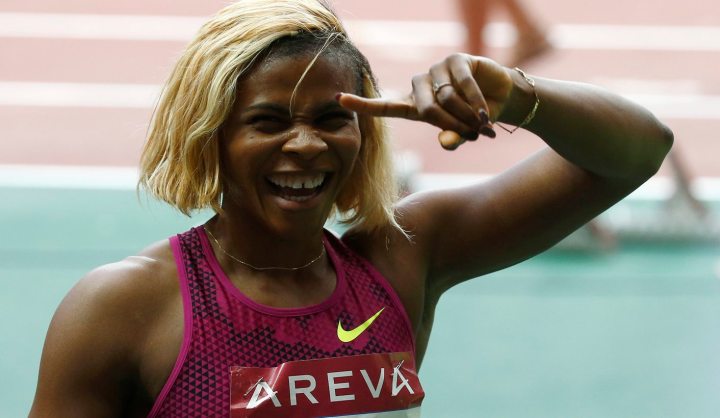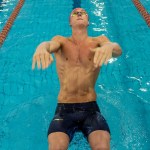Sport
A Blessing in disguise: Okagbare’s journey to Commonwealth Gold

Blessing Okagbare, who stormed to gold in the Commonwealth Games 100 metres on Monday, only took up sprinting in 2009. She is one of many West African sprinters who are clear evidence that the sporting talent in the region needs to be looked after better. By ANTOINETTE MULLER.
Nigeria’s Blessing Okagbare stormed to Commonwealth gold in the women’s 100 metres with a time of 10.85 seconds on Monday night. It was a great change from the 2012 London Olympics when the 25-year old finished stone-last. In her Commonwealth race she was dominant and powerful, completely obliterating her opposition. And the best part is, sprinting isn’t even her first sport.
It’s something that has been a long time coming. Last year in August, Okagbare made history when she became the first ever African female sprinter to win a medal at the World Athletics Championships. For the uninitiated, it’s something that challenges the usual perceptions of African athletes. Usually, African athletes are associated with long distance running.
Thousands of articles have been written to try and theorise what makes East African runners so good and so dominant. The continent has delivered some of the finest long-distance runners of our generation, but Okagbare is a new breed of athlete, hoping to change the way Africans compete.
The last 25 holders of the world record for the 100-metre sprint were black and, in 2007, a report showed that 494 out of 500 of the best-ever 100m sprint times were held by athletes of West African origin – meaning they were either born there or they can trace their roots back there. There is clearly a need to foster the sprinting talents of this region of Africa. Much research has been done as to whether this is down to a genetic advantage, but no clear conclusions have been drawn yet.
In 2003, it was found that a variation of the ACTN3 gene is associated with sprinting success (through its impact on fast-twitch muscle fibres), and although 98 percent of Jamaicans have the gene, 82 percent of Europeans do too. The gene was also present in Kenyans, who have had great long-distance success but very little success in sprinting.
Whatever the reason for seemingly zoned success from West African sprinters will remain a mystery for now, but that Okagbare has made it this far is largely down to a fairytale story all on its own, because athletics suffers in many African countries.
She now lives in America, a move that was made in order to aid her career. When she won in Moscow last year, the Media Officer of Athletics Federation of Nigeria (AFN), admitted that athletics had been “neglected” for the last 15 years and that no new facilities had been developed and the old ones were not being maintained properly.
She was born and raised in Sapele, a southern city in Nigeria. As a child, she took her first steps towards athletics by taking up street high jump. Developing her talent was tough, she says. Although she was good at athletics in general, she was never a sprinter. She was, however, superb at long jump.
“When I started to train, transportation was a major problem for me. I had to walk from my house to the track, it was really far, a long distance,” she said in an interview last year. “Sometimes I would struggle to get a good meal to eat.”
When she was 18, she was spotted at the 2007 All Africa games, where she won a silver medal in long jump. Colleges in the United States sat up and took notice. They knew she had something special about here. She was given a scholarship to study at the University of Texas and everything changed. It is here where she took up sprinting, the sport that has made her a household name. She only started sprinting in 2009, after being advised by her coach.
She is one of the lucky ones, given an opportunity and grabbing it by the scruff of the neck. She remains a proud Nigerian and hopes to raise the profile of athletics in Africa through her achievements.
“It’s an honour to make a bit of history for Africa. I may live in the United States but I am a proud African and moments like this are wonderful when I feel I am putting them on the map in athletics,” she said last year.
There might be some pressure on her to keep on carrying the flag, but she is no stranger to pressure. At the 2008 Beijing Olympics, her first major global championship, she admits that she didn’t fully comprehend the importance of winning a medal, but she feels far more grown up now.
“When I won the long jump bronze at the 2008 Olympics I was only 19 and still naïve. But as I grew through the years I learnt so much. At first it was difficult to cope with the pressure and what people were saying. But athletes don’t go out to fail and when they do it is really tough for them.
“Now I don’t pay attention to what people say and I don’t worry about what may come in the future.
“I just hope that people will look back and say I gave Africa something to smile about at a World Championships,” she said last year.
She certainly did and now she has given her homeland even more reason to smile. She is fast becoming a modern-day athletics heroine. Okagbare’s success at the Commonwealth Games can, hopefully, inspire others to follow in her footsteps and for the countries where athletics is being so neglected to finally wake up. With such a charismatic torch bearer at the heart of the cause, things might just be on the up. DM
Photo: Blessing Okagbare from Nigeria reacts after she won the 200m Women during the Areva Diamond League athletics meeting in Paris, France, 05 July 2014. EPA/ETIENNE LAURENT



















 Become an Insider
Become an Insider